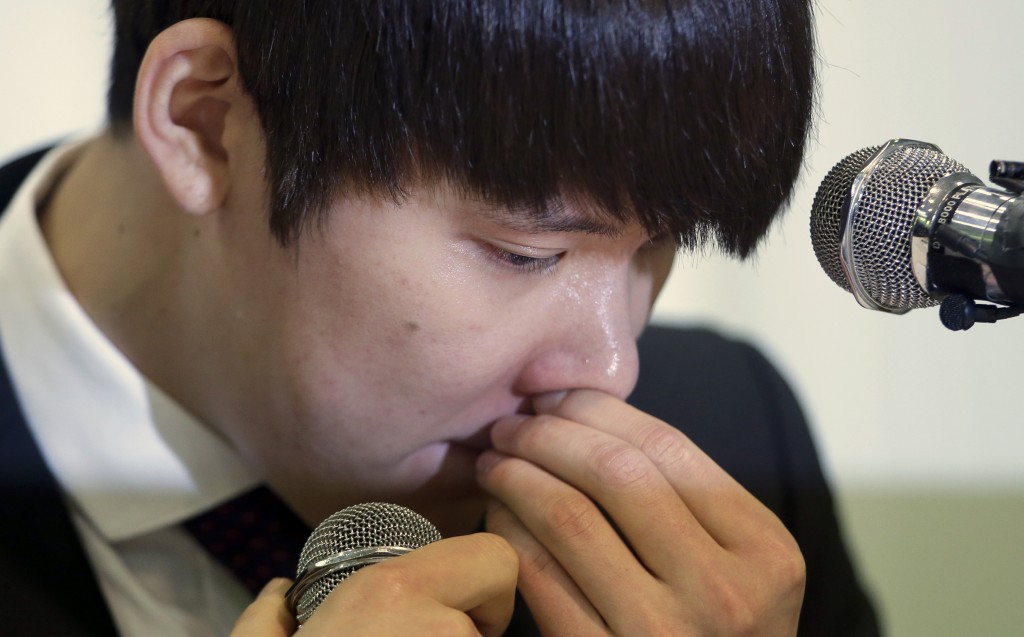- California Assembly OKs highest minimum wage in nation
- S. Korea unveils first graphic cigarette warnings
- US joins with South Korea, Japan in bid to deter North Korea
- LPGA golfer Chun In-gee finally back in action
- S. Korea won’t be top seed in final World Cup qualification round
- US men’s soccer misses 2nd straight Olympics
- US back on track in qualifying with 4-0 win over Guatemala
- High-intensity workout injuries spawn cottage industry
- CDC expands range of Zika mosquitoes into parts of Northeast
- Who knew? ‘The Walking Dead’ is helping families connect
Park Tae-hwan apologizes

Former Olympic swimming champion Park Tae-hwan of South Korea holds back his tears during a news conference in Seoul, South Korea, Friday, March 27, 2015. Former Olympic swimming champion Park Tae-hwan of South Korea offered a public apology Friday, four days after receiving an 18-month ban for failing a doping test. (AP Photo/Lee Jin-man)
By Yoo Jee-ho
SEOUL, March 27 (Yonhap) — Disgraced South Korean Olympic swimming champion Park Tae-hwan on Friday apologized to the public for his recent doping scandal, saying he was ashamed of himself for letting down so many people.
Park held a press conference at a Seoul hotel, his first public appearance since FINA, the international swimming federation, handed down an 18-month suspension Monday after he’d tested positive for testosterone, a substance banned by the World Anti-Doping Agency (WADA).
FINA collected Park’s samples on Sept. 3 last year and his suspension began retroactively on that day. It will end on March 2, 2016.
Park, a national icon who remains the only South Korean with an Olympic swimming gold, had previously argued that a Seoul-based doctor had given him an injection without fully disclosing that it could contain a banned substance. The doctor was later indicted on charges of professional negligence and will stand trial next month.
On Friday, the 25-year-old took the full responsibility for the positive test.
“I’d like to apologize to the people for causing so much trouble with this unacceptable incident,” Park said, fighting back tears as he read from a statement.
“When I first learned of the test result, I felt something must have been wrong. But then I realized I should have been more careful. Regardless of reasons or processes, I think it’s my fault that things have come to this point.”
FINA also stripped Park of all medals earned after Sept. 3. The suspension cost Park six medals he’d captured at the Incheon Asian Games, when all swimming races were held at an arena bearing Park’s name. Three of those medals came in relays, and Park’s teammates in those races will lose their medals because of Park’s suspension.
While his suspension will end before the start of the 2016 Olympics in Rio de Janeiro, it remains unclear whether Park, the first and only South Korean with an Olympic swimming medal, will be able to compete in his fourth Summer Games.
Under a rule instituted last July by the Korean Olympic Committee (KOC), an athlete who has been suspended for a drug-related offense is ineligible for any national team for three years, starting from the day the suspension ends.
Park’s situation has sparked debate over the potential double punishment of the KOC’s rule. Critics of the rule say Park shouldn’t be penalized for the same offense and that he deserves a second chance, given his contribution to the sport. On the other hand, there are those who believe Park shouldn’t receive any special treatment and the rule should be applied to all athletes equally.
















